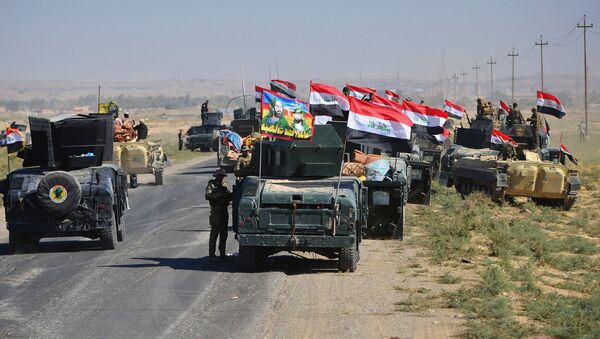Turkey, and other countries bordering Iraqi Kurdistan fear that the formation of an independent Kurdish state in northern Iraq could accentuate Kurdish efforts for independence domestically.
In response to the referendum, which was held in September, Turkey and Iran severed trade ties with the Kurdish Regional Government (KRG) in a number of strategic economic areas, particularly the energy sector, which generates a large chunk of the KRG's budget. Last month, Iran banned the transportation of refined crude oil products to and from Iraqi Kurdistan.
As well as serving as a large buyer of Kurdish oil and natural gas, Turkey has also acted as a conduit, transporting hundreds of thousands of barrels of oil from Kurdistan to Europe, via a pipeline to Ceyhan. In the run-up to the referendum, President Erdogan warned that he may close the pipeline if the KRG pressed ahead with its quest for independence.

Since then, tensions have further escalated, with the Iraqi Army and popular mobilization units (PMUs) seizing control of Kirkuk airport, the K-1 military base, and two oil fields on Monday, October 16. Kirkuk was captured by Kurdish Peshmerga forces in 2014, after Iraqi forces collapsed during Daesh' blitz offensive.
The KRG's controversial decision to allow voting in Kirkuk, and other disputed territories, increased international opposition to the referendum, isolating the Kurds to an even greater extent.
"We assure our people in Kurdistan and Kirkuk that we are protecting their security and interests, and have only fulfilled the constitutional duty of expanding federal authority, establishing security and protecting national wealth in the city," Iraqi PM Haidar al-Abadi was quoted as saying.
Meanwhile, a press release by the Prime Minister's Office of Iraqi Kurdistan described the operation as "the announcement of war against Kurdistan."
The deployment of Iraqi forces to Kirkuk drove world oil prices up on October 16, with Brent Crude rising by 1.5% to US$58.04 a barrel.
As Iran, Turkey and Iraq exert more and more pressure on Iraqi Kurdistan to deter domestic Kurdish separatist militants, Syria, which also forms part of the theoretical Kurdish state, has adopted a less hostile approach. Although Syria condemned the Kurdish referendum on independence, it is yet to implement or announce any punitive response, in contrast to Iran, Turkey and Iraq.
Just a single day after the independence referendum, Syria's Foreign Minister Walid al-Moualem said his government are willing to hold negotiations with Kurdish forces in Syria to discuss proposals to grant them more autonomy, indicating Syria's pragmatic approach to addressing growing Kurdish aspirations for autonomy, despite the Kurds' weakening position.
"This topic [limited Kurdish autonomy in northern Syria] is open to negotiation and discussion and when we are done eliminating Daesh we can sit with our Kurdish counterparts and reach an understanding on a formula for the future," Syria's longstanding Foreign Minister, Walid al-Moualem, said.
In the eastern province of Deir ez-Zor, both the Syrian Army and Kurdish-dominated SDF forces are battling Daesh terrorists, seemingly racing to capture strategic oil fields.
However, in spite of the apparent hostility between the SDF and the Syria government, they have maintained strong ties throughout the duration of the ongoing crisis, with reports of the Syrian government and YPG forces continuing with revenue-sharing agreements in the oil sector.
According to these reports, the Syrian government keeps 65% of the revenue, with the YPG taking a 20% cut, and the remainder is paid out to Arab forces defending the oil fields.
In the context of the wider conflict, some Syrian officials don't view the Kurdish-led SDF as inherently hostile, and to some extent, the Kurds' seizure of vast swathes of territory in northern Syria has aided the government, as it prevented Islamist militants from gaining additional territory, while also inhibiting the flow of Turkish arms to Islamist militants.
The views expressed in this article are solely those of the author and do not necessarily reflect the official position of Sputnik.
Follow Suliman Mulhem on Twitter


